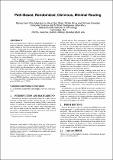| dc.contributor.author | Cho, Myong Hyon | |
| dc.contributor.author | Lis, Mieszko | |
| dc.contributor.author | Shim, Keun Sup | |
| dc.contributor.author | Kinsy, Michel A. | |
| dc.contributor.author | Devadas, Srinivas | |
| dc.date.accessioned | 2010-02-25T14:55:18Z | |
| dc.date.available | 2010-02-25T14:55:18Z | |
| dc.date.issued | 2009 | |
| dc.date.submitted | 2009-12 | |
| dc.identifier.isbn | 978-1-60558-774-5 | |
| dc.identifier.uri | http://hdl.handle.net/1721.1/51826 | |
| dc.description.abstract | Path-based, Randomized, Oblivious, Minimal routing (PROM) is a family of oblivious, minimal, path-diverse routing algorithms especially suitable for Network-on-Chip applications with n x n mesh geometry. Rather than choosing among all possible paths at the source node, PROM algorithms achieve the same effect progressively through efficient, local randomized decisions at each hop. Routing is deadlock-free in all PROM algorithms when the routers have at least two virtual channels.
While the approach we present can be viewed as a generalization of both ROMM and O1TURN routing, it combines the low-hardware cost of O1TURN with the routing diversity offered by the most complex n-phase ROMM schemes. As all PROM algorithms employ the same hardware, a wide range of routing behaviors, from O1TURN-equivalent to uniformly path-diverse, can be effected by adjusting just one parameter, even while the network is live and continues to forward packets. Detailed simulation on a set of benchmarks indicates that, on equivalent hardware, the performance of PROM algorithms compares favorably to existing oblivious routing algorithms, including dimension-ordered routing, two-phase ROMM, and O1TURN. | en |
| dc.language.iso | en_US | |
| dc.publisher | Association for Computing Machinery | en |
| dc.relation.isversionof | http://doi.acm.org/10.1145/1645213.1645220 | en |
| dc.rights | Attribution-Noncommercial-Share Alike 3.0 Unported | en |
| dc.rights.uri | http://creativecommons.org/licenses/by-nc-sa/3.0/ | en |
| dc.source | author/dept web page | en |
| dc.title | Path-Based, Randomized, Oblivious, Minimal Routing | en |
| dc.type | Article | en |
| dc.identifier.citation | Cho, Myong Hyon et al. “Path-based, randomized, oblivious, minimal routing.” Proceedings of the 2nd International Workshop on Network on Chip Architectures. New York, New York: ACM, 2009. 23-28. | en |
| dc.contributor.department | Massachusetts Institute of Technology. Department of Electrical Engineering and Computer Science | en_US |
| dc.contributor.approver | Devadas, Srinivas | |
| dc.contributor.mitauthor | Cho, Myong Hyon | |
| dc.contributor.mitauthor | Lis, Mieszko | |
| dc.contributor.mitauthor | Shim, Keun Sup | |
| dc.contributor.mitauthor | Kinsy, Michel A. | |
| dc.contributor.mitauthor | Devadas, Srinivas | |
| dc.relation.journal | Proceedings of the 2nd International Workshop on Network on Chip Architectures | en |
| dc.eprint.version | Author's final manuscript | |
| dc.type.uri | http://purl.org/eprint/type/SubmittedJournalArticle | en |
| eprint.status | http://purl.org/eprint/status/PeerReviewed | en |
| dspace.orderedauthors | Cho, Myong Hyon; Lis, Mieszko; Shim, Keun Sup; Kinsy, Michel; Devadas, Srinivas | en |
| dc.identifier.orcid | https://orcid.org/0000-0001-8253-7714 | |
| dc.identifier.orcid | https://orcid.org/0000-0003-4301-1159 | |
| dspace.mitauthor.error | true | |
| mit.license | OPEN_ACCESS_POLICY | en |
| mit.metadata.status | Complete | |
